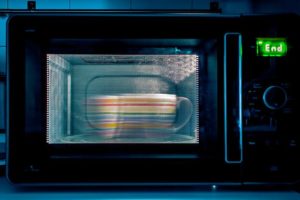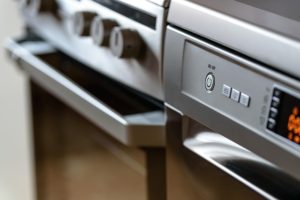Archive for the ‘microwave’ Category
How Do You Know When Your Microwave Needs Repair or Replacement?
December 11th, 2023
A microwave oven is arguably the most convenient appliance in today’s modern kitchen. Whether preparing side dishes, quickly reheating leftovers, defrosting frozen meat, or cooking complete microwave meals, we’ve come to really depend on them.
So what should you do when your microwave starts to malfunction? Do you call a microwave repair technician? Or do you toss it out and shop for a replacement? The answer generally depends on the repairs that are needed and the age of your unit. Certainly, you don’t want to spend more on a repair than the cost of a new microwave. Then again, why discard a perfectly good appliance if the problem with it requires a simple, inexpensive fix? Below is a list of problems that are commonly encountered with microwave ovens and whether they warrant calling a microwave repair technician–or calling it quits.
The interior light in your microwave no longer works
Not sure how long you should heat up yesterday’s takeout? The interior light is a nice feature that allows you to peek inside to see how the reheat is going. If the light is burned out, however….
Sometimes a non-functioning interior light is a straightforward problem with an easy fix. It could be due to a bulb that is not screwed in tightly. It could be a bulb that has burned out. In each case, it may simply require removing the casing, and possibly the coverplate over it if there is one and tightening or replacing the bulb. However, it could also be caused by faulty switches in your microwave oven’s door latches or even a faulty circuit board. A qualified microwave repair technician can evaluate the problem, provide you with a repair quote, or make other recommendations.
Your microwave turntable stops turning
Have you ever plunged your fork into a microwaved meal only to find one bite hot and tasty while the next is cold and under cooked? It’s the turntable’s job in a microwave oven to rotate food in the oven’s cooking chamber so that heat is evenly distributed and food evenly cooked. That’s why if your turntable stops working, you may experience more of those unpleasant meals.
But that doesn’t mean you should toss your microwave oven out, especially if it’s less than five years old. First check the obvious. Is there anything under the roller guide or tray support that is blocking the tray’s movement? If not, then you may have a defective or burned-out motor. Or, you could have a bad belt or door switch. Or, it could just as easily be that the coupler that attaches to the drive motor shaft is broken or stripped.
Here again, a qualified microwave repair technician can evaluate the problem with your turntable motor and make the necessary repairs. The technician may also find that your microwave has simply aged to the point that it is no longer able to distribute electromagnetic waves properly. In that case, they may recommend purchasing a replacement.
And while we’re on the subject of turntables, be aware that heat will damage them over time. If your turntable becomes chipped or cracked, be sure to replace it right away. Standard replacements can often be found in local supermarkets, retail outlets or online.
Your microwave makes loud noises, or emits smoke or sparks
When you’ve had your microwave oven for a while, you know the kind of ordinary hum it makes when in operation. If the sounds of your microwave start to change significantly, moving from a whir or hum to loud buzzing or rattling, this can be an indication of a serious problem.
You should have even more cause for alarm if your microwave begins emitting smoke or sparks, or if smells like it is burning. In any of these cases, unplug your appliance immediately and open your kitchen windows to safely air the room out.
Most microwave ovens have a lifespan of about eight to ten years, and serious problems such as these are clear signals that your microwave has reached its life’s limit and should be replaced. If you experience these problems with a younger appliance, however, be sure to check your warranty. You may be entitled to a free replacement. A seasoned microwave repair technician should be able to make a good recommendation on the best brands or models to purchase.
One Final Note
As with any appliance, it’s important to weigh the microwave repair estimate along with the unit’s given age against the price of a replacement. It’s equally important that you not endeavor to take on any serious repairs yourself unless you are confident you have the necessarily skills to do the job.
A reputable microwave repair technician should be able to investigate and determine whatever the problem is with your appliance and provide you with solid workmanship and expert advice.
Posted in microwave | Comments Off on How Do You Know When Your Microwave Needs Repair or Replacement?
Are Small Home Appliances Worth Repairing?
November 28th, 2023
Many people tend to get rid of broken home appliances and buy new ones. However, before throwing it away, opting for a repair would be more economical. Sometimes it can be hard to determine whether the equipment needs a repair or replacement. Therefore, we will offer professional guidance based on certain home appliances. This guide will enable you make the right decision.
Is It Worth Repairing a Microwave?
There are several factors considered before opting for the repair or replacement of a microwave.
When to Repair
During repair, the depreciation of the existing microwave and the cost of replacement is key. If the repair cost is less than the cost incurred to buy it, the repair can be worth it. Moreover, if you paid more money for the microwave, you can repair it if it’s still under warranty. This should be a period of at least 5 years or less.
There are also some minor damages that are worth the repair. When there is an interior light malfunction, you can seek a microwave repair rather than a replacement. Door switch problems are also a minor problem that needs repair. Also, when you have a broken touchpad, a microwave repair can be better.
When to Replace
When your microwave is more than five years old, a microwave replacement is essential. Furthermore, a microwave repair can include hiring trained personnel. In such cases, the cost of repair becomes very high. Therefore, you can opt for a quick replacement.
Other factors that can require a replacement can include loud noises while cooking. When there is a loud buzzing when you hit the start button, this calls for a replacement. Moreover, when the cooking time extends, this can mean that your microwave is old. Therefore, it needs replacement.
Should I Opt for a Dishwasher Repair or Replacement?
A dishwasher is an important equipment in the kitchen. It helps to avoid washing dishes by hand. It is therefore crucial to make the right decision when it comes to a dishashwer repair or replacement. Below are some of the factors you can consider.
Your Dishwasher’s Age
If your dishwasher is more than nine years old, it can be worth replacing it. An old dishwasher will break down more frequently. Therefore, it can be quite costly paying for the repairs.
However, if your dishwasher is less than nine years old, a dishwasher repair can be worth it. At this time, minor issues can be easier to repair at a lower cost. Some of these minor issues can include clogs, broken doors, and door leaks.
Cost
When the cost of a dishwasher repair exceeds the price of a new one, a replacement is economical. This will help minimize the amount of money spent on frequent repairs. A dishwasher repair can be a good choice when its cost is less than that of buying a new one.
Damage of Major Parts
When major parts of a dishwasher break down, this can reduce its efficiency. Therefore, you should opt for a dishwasher replacement. A new dishwasher is more efficient saving on water and energy bills. Some of the features to look at include damage to the energy-efficient motors. Damaged sensors that adjust wash cycles can affect its efficiency. Damaged Eco-modes increase energy consumption reducing the performance of your dishwasher.
Oven Repair or Replacement?
Choosing between an oven repair and a replacement can be challenging. However, understanding the advantages of each of them will help you choose the one you see fit for your oven.
Advantages of an Oven Repair
It can be very cost-effective. In most cases, it is normally cheaper to repair an oven than buying a new one. An oven repair can also help maintain your preferred oven features. Replacing your oven means you will have to adjust to new features and lose your preferred ones.
Advantages of an Oven Replacement
A newer oven is more energy efficient. This helps to minimize utility bills. The more oven repairs done, the less efficient it becomes. Therefore, for an efficient oven, replacement is crucial.
Moreover, a new oven comes with a warranty. This provides you with free oven repairs if anything happens within the specified period.
Finally, both the repair and replacement of your home appliances need qualified personnel. Avoid doing it yourself as this can cause more damage. An expert in the field will ensure that your appliances are working properly. They will also advise on the right time to go for a repair or a replacement.
Posted in dishwasher, disposal, freezer, general, microwave, refrigerator, seasonal, stove, washing machine, wine cooler | Comments Off on Are Small Home Appliances Worth Repairing?
Is Your Appliance Worth Repairing?
May 13th, 2021
Appliances help us keep our lives on track. Where would we be without our refrigerator/freezer, washing machine, dryer, dishwasher, microwave, and garbage disposal? When any one of these stops functioning, it can quickly turn from an inconvenience into a disaster. Your immediate impulse might be to replace the appliance that is broken. But is that always the right option? Here is a quick guide to help you decide whether your appliance is worth repairing.
How Much Would It Cost?
Generally, the larger the appliance the costlier it is. So if your stove breaks, you’re looking at a major investment to buy a new one. But if your microwave goes, you can purchase one for under $75. Consumer Reports advises that if the cost to repair your appliance is greater than half the cost of a new one, it makes sense to replace it. Obviously you won’t know how much the repair would cost without consulting an appliance repair service. At Dave’s Appliance, our experts can diagnose your appliance’s problem and give you an estimate for the repair. With all of that information, you can make an informed decision.
Which Appliance Is it?
Other than cost, you have to consider how much you value your current appliance. Your refrigerator/freezer may have external ice and water dispensers, pull-out shelving, and other features you really appreciate. Your washer and dryer may fit just perfectly into the space in your utility room. Maybe you love to cook and bake and your stove suits you perfectly. It might even be that your appliances coordinate with your decor. These are definitely legitimate reasons to hesitate about replacing them when they break. Again, a visit from one of the friendly members of Dave’s Appliance team will help you understand the extent of your problem.
How Old Is It and Is It Still Under Warranty?
Major appliances like refrigerators or chest freezers often last from 10 to 20 years. Other appliances like trash compactors have an average life span of about 6 years. Most appliances also come with warranties, and often those can be extended if you choose to do so. When an appliance breaks down, it would be a good idea to find out if its warranty is still in force. If it’s not, check to see what the average life span is for your brand of that particular appliance.
What’s The Environmental Impact?
Often, the environmental impact of repairing or replacing isn’t considered at all. But perhaps you should think about it. If your appliance is old and inefficient, it may be using a lot of electricity. That’s bad for the environment and bad for your utility bills. If your appliance was made after 1992, it should have an Energy Star Rating to let you know how efficient it is. You can compare it to current appliances’ efficiency. On the other hand, your old appliance can’t just be thrown out. Major household appliances are banned from landfills in Wisconsin and the state urges that they be reused or recycled. In many places in Wisconsin, appliances are not picked up at the curb with other recyclables, nor are they accepted at many general recycling drop-off sites. It may be the more environmentally-responsible choice to repair rather than replace.
Whatever your appliance concern, the experts at Dave’s Appliance will be able to tell you what the problem is and help you decide whether or not it’s worth repairing. Give us a call.
Posted in appliance repair, clothes dryer, dishwasher, disposal, freezer, general, microwave, refrigerator, seasonal, stove, washing machine, wine cooler | Comments Off on Is Your Appliance Worth Repairing?
How To Test Microwave Ovens
October 5th, 2020
Microwave ovens are like any other electrical appliance, in that it will gradually wear out. This is due principally to gradual degradation of the magnetron tube that generates the energy that heats the materials that you put into it. If you’re interested in how a magnetron tube converts high-voltage electricity into microwaves, there’s a Wikipedia entry here. For most of us, though, it’s enough to know that over time, the tube will wear down and produce less microwave energy, requiring more time to bring things to the desired heat. In higher power-rated microwaves, the degradation may be less noticeable for a time, but for lower powered units, a fall-off may mean that the device is no longer very useful.
If you’ve thought that your microwave no longer cooks as quickly or as thoroughly as it used to, you may be correct. One common sign is that you hit a preset power and time setting, such as to pop microwave popcorn or heat a coffee mug of water, and it doesn’t quite do the job. Of course, the speed at which it cooks when it is new depends on the power rating. Higher powered microwaves are often rated at around 1200 Watts, and some even higher. Low power models are typically 700 Watts rated. Anything under 700 Watts is probably not very good for cooking food. You can see how to convert power ratings and times required here.
Down and Dirty Test #1
So, how can you test? Well, the most obvious way is to find out what your microwave’s power rating is (often noted on the back of the appliance, and certainly in the owner’s manual), and use the time for specified power instructions on some microwave friendly food’s preparation instructions. If you don’t want to waste food, a packet of microwave popcorn might be a good place to start. Presumably, if your microwave isn’t heating to what the power rating and time of preparation expectations are, it isn’t performing to specifications, although this assumes that the preparation instructions are accurate.
Down and Dirty Test #2
Another down-and-dirty way of testing is to fill a coffee mug with water and boil it on high (the microwave’s default setting) for 1 minute. The water should in most cases have begun to boil by then. Again, though, this is just presumptive proof that it’s not operating to specification. What it means, more than anything, is that our expectations have been raised to the point where we think that is a reasonable time in which water ought to boil in a microwave.
More Scientific Test: The JIS Microwave Power Method
You can find this method outlined at Celtek Electronics. You need:℃
2 identical 500 mL beakers (or other microwavable containers)
An accurate thermometer
A stirrer (wooden is good, like a popsicle stick/tongue depressor/coffee stirrer)
1) Stir and divide 1000 mL of water that’s 20℃ plus or minus 5℃ into the two containers, to ensure that they are both of the same temperature.
2) Measure the temperatures of both, add those temperatures and divide by two to average the results.
3) Position both containers near the center of the microwave’s turntable. At full power, switch the microwave on for 60 seconds.
4) Remove both containers immediately, stir, and measure the temperatures the same way: note each and add together, then divide by two to average.
5) Now subtract the starting temperature average from the ending temperature average (for example, 40 minus 20 equals 20). Now take that number, and multiply by 70 to give the estimated wattage. In this case, 20 times 70 equals approximately 1400 Watts.
Compare that to the manufacturer’s specified power. If it’s not near the mark, it may be time to get a new microwave oven. Even if it’s close, it may be that your life circumstances have changed, and you find you need a larger capacity or a higher power rating for a growing family, or maybe you’re doing more food preparation than you used to, or you just want a change.
Whatever is causing your dissatisfaction with your microwave, Dave’s Appliance has the experience and the selection to get you the unit that will suit you best. They are happy to put their experience at your service. Give them a call.
Posted in microwave | Comments Off on How To Test Microwave Ovens
How To Fix a Microwave That Won’t Turn On
October 5th, 2020
It could be a simple fix, or not. If it is, you are going to have to be a little handy, and it helps to have a multimeter and to know how to use one. When in doubt, call a professional or replace the unit.
The first thing is to check that it is properly plugged in, and to check the circuit breaker. You might want to try testing the outlet with another appliance before making a trip to the circuit box.
If all of that seems fine, the first thing to check will be the door latch. Has it been sticky? Has it been loose or not closing properly the first time? If the safety interlock on the door isn’t making proper contact, this will prevent the microwave from turning on. The reason is that the door must be properly closed in order to prevent stray microwaves from endangering your health. It is a safety feature.
Testing the Interlock Switch
1) Unplug the microwave.
2) Check the hooks that are on the door to make sure that they are not deformed. If they are, this can prevent the interlock switch from permitting the microwave to be turned on. You can think of the door hooks as being a kind of key that activates the interlock switch.
3) If the door hooks seem to be fine, and lining up properly with the interlock switch, you can remove the interlock switch by unscrewing it from the microwave.
4) Now set your multimeter to Rx1, turn it on, and touch the probes to the terminals. You should see a reading of “0” [zero], indicating that the circuit is continuous.
5) If your switch is not continuous, you can try spraying it with contact cleaner, thought that is likely a temporary solution. If it is not, you will want to get a replacement switch.
If you feel uncomfortable with any of these steps, you are probably best off contacting Dave’s Appliance instead of fixing it yourself.
Checking the Ceramic Fuse
If your microwave won’t start, and you can’t get a reading on the display, it could be that the ceramic fuse has blown. This fuse is there to protect the electrical components of your microwave from damage in case of power fluctuations. If the fuse is blown, nothing on your microwave will work until it is replaced.
1) Unplug the microwave.
2) Locate the fuse near the power cord. This may entail removing the microwave from its cabinet. Remove it.
3) As with testing the interlock switch, set your multimeter to Rx1, activate it, press the probes to both ends of the fuse. It should read “0” [zero]. If you don’t have a multimeter, and you happen to have a replacement fuse, though that is unlikely, you can try replacing it, but be very careful to make sure you have the proper replacement. You can also bring your fuse to a local electrical supply shop, and have them test it for you and get a replacement, if that is the problem.
Again, if any of the above makes you uncomfortable, it is best to seek professional help. The folks at Dave’s Appliance have seen these problems thousands of times, and can give you the advice you need.
For all other potential problems involving microwaves, you are best leaving things to the pros, unless you really have some good electrical problem-solving chops. Check to see whether your unit is still under warranty. Or maybe it’s just time to replace your microwave, although in many cases owners have become so accustomed to how a particular microwave works that they are reluctant to part with it. Or perhaps the microwave you have is part of a kitchen appliance ensemble that matches, and you don’t want to disrupt the way it hangs together.
At any rate, the helpful professionals at Dave’s Appliance are happy to advise you in the way that best suits your needs. Give them a call.
Posted in microwave | Comments Off on How To Fix a Microwave That Won’t Turn On
Microwave Not Spinning? How to Fix a Microwave Tray that Won’t Turn
February 26th, 2020
Microwaves make your life so much easier. But if the turntable inside the microwave stops functioning, then it’s likely the food will not cook evenly. There are a number of reasons your microwave tray may stop spinning. In this post, we will examine each potential cause and how you can fix it.
Interior Debris
Sometimes when you microwave food, food particles can splatter all over the interior of the oven. It is possible for them to become encrusted on the tracks of the roller guide or the coupler. The solution is extremely simple: thoroughly clean the interior of the oven.
Remove the round, glass microwave tray and the roller guide; check to make sure that there is no stuck-on food that might inhibit turning
Wash in warm soapy water
Wash out the interior of the microwave
Replace roller guide and tray
Test it out and if your tray turns, you’ve solved the problem!
Roller Guide
If a thorough cleaning doesn’t do the trick, the issue may be with the roller guide. The roller guide works with the coupler to rotate the turntable. It has a center part that fits on the coupler and then the outer circle guides it along the track. When you take the roller guide out to clean it, make a comprehensive inspection of it.
Examine the wheels on the guide to ensure they turn freely with no resistance
Look for any signs of wear, cracking, discoloration, or damage
Look at the fitting for the coupler; any cracks or damage may mean that it is not engaging properly
If you find any issues, you will need to have a replacement roller guide.
Coupler
The coupler is the center piece in your microwave oven that attaches to the drive motor below. It connects to the roller guide as well. If the coupler is damaged, then the energy from the drive motor is not being transferred to the roller guide. Here’s how to figure out if the coupler is the culprit.
Disconnect your appliance from the power source
Locate your drive coupler – in most models, that means removing the tray and roller guide; in some models, you will need to remove the motor from the floor of the microwave to find the coupler
Remove coupler – most models will have a three sided coupler that will just pull off of the motor shaft.
Examine coupler – it normally has a D shaped opening that fits tightly onto the motor shaft and you should look for cracks, discoloration or wear
If you identify any issues, you will need a replacement drive coupler.
Drive Motor
The drive motor that powers the turntable is located in the floor of the microwave. If you have eliminated all of the causes above, you will need to check the drive motor. This is a more extensive undertaking and you may want to contact the experts at Dave’s Appliance. If you decide to tackle it yourself, then you should be prepared with a multi-meter and other tools.
Disconnect your appliance from the outlet
Remove drive motor – you will need to remove the cabinet in order to get at it, and then disconnect the wires and retaining screw
Test drive motor – using a multimeter set to the highest setting, test for continuity by touching the probes to the terminals; you should receive a reading of zero if your motor is functioning properly.
If your test results aren’t zero, or if your microwave makes grinding noises, then you may need a replacement drive motor. Dave’s Appliance can help.
Posted in microwave | Comments Off on Microwave Not Spinning? How to Fix a Microwave Tray that Won’t Turn
Cooking Machine Gone Bad: Signs Your Microwave Needs Fixing
July 11th, 2019

1. Food Takes Longer to Heat
The main advantage of a microwave is speed. When this appliance isn’t working properly, your food may take longer to cook. Frustration causes some people to prematurely purchase a brand-new unit. However, you can save a lot of money by getting your microwave repaired. Damaged seals could be causing your microwave to lose heat. (more…)
Posted in microwave | Comments Off on Cooking Machine Gone Bad: Signs Your Microwave Needs Fixing
Signs Your Microwave Might Need a Repair
March 14th, 2018

A lot of malfunctions will get worse over time unless you take fast action to avoid trouble. Learning about common red flags will give you confidence as you move forward because you will know what to expect. Armed with the right tips and knowledge, you will spot the difference between a healthy microwave and one that needs a repair. (more…)
Posted in microwave | Comments Off on Signs Your Microwave Might Need a Repair
Natural Cleaning Products to Clean Your Appliances
January 10th, 2017

Clean Just About Anything
For a safe and effective all-purpose household cleaner, combine the following ingredients in a spray bottle:
(more…)
Posted in cleaning, dishwasher, microwave, refrigerator, stove, wine cooler | Comments Off on Natural Cleaning Products to Clean Your Appliances
Simple Tricks to Keep Your Appliances in Good Shape During the Winter
December 15th, 2016

Posted in clothes dryer, microwave, refrigerator, seasonal, washing machine | Comments Off on Simple Tricks to Keep Your Appliances in Good Shape During the Winter








